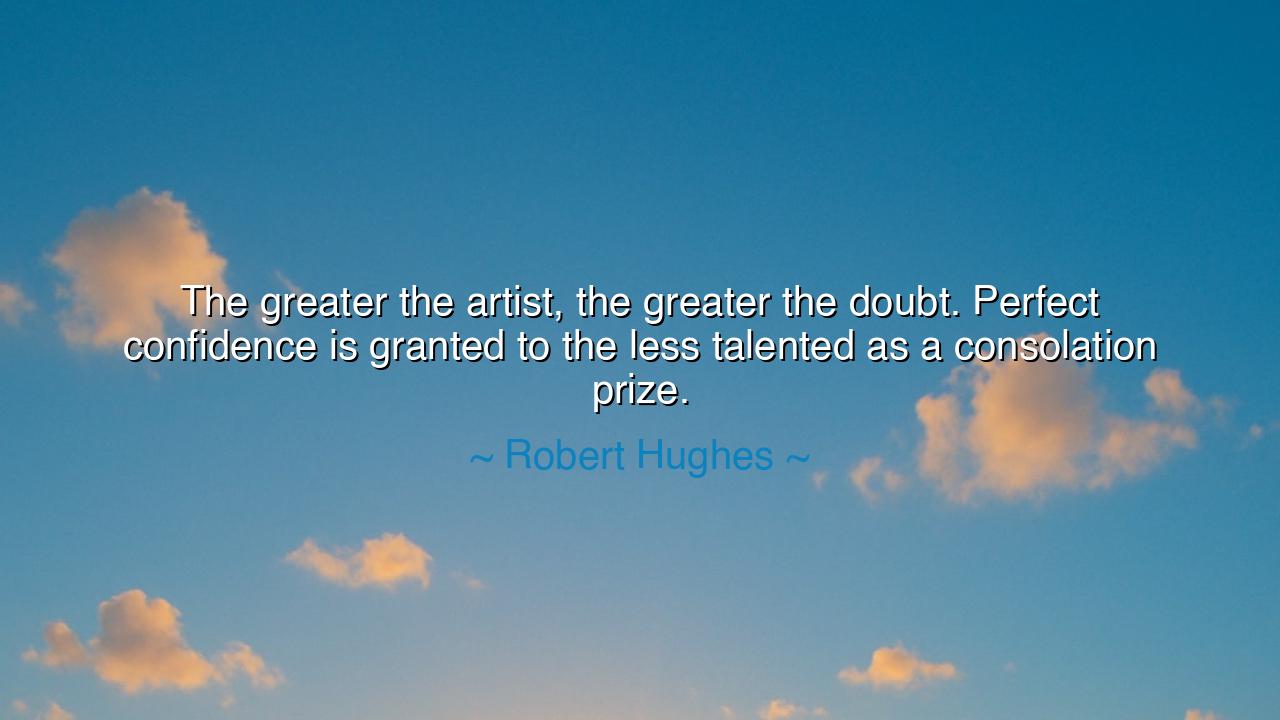
The greater the artist, the greater the doubt. Perfect confidence
The greater the artist, the greater the doubt. Perfect confidence is granted to the less talented as a consolation prize.






"The greater the artist, the greater the doubt. Perfect confidence is granted to the less talented as a consolation prize." Thus spoke Robert Hughes, the fierce critic and chronicler of art, whose words pierce like the sculptor’s chisel through the marble of illusion. In this saying lies a paradox both humbling and profound: that doubt, so often feared as weakness, is in truth the companion of greatness. The truest creators are those who question, who tremble before their own work, who strive endlessly because they never believe they have fully arrived. Their uncertainty is not their flaw — it is their proof of depth, their sign of a soul reaching beyond the limits of form and self.
The lesser artist, content with his small achievements, rests easily. His confidence is perfect because his vision is shallow; his world ends where his understanding does. But the greater artist — the one who sees farther and feels deeper — lives in the torment of knowing how much remains unseen, how much remains undone. The higher the summit, the more one beholds the mountains beyond. Thus, the masters of every age — poets, painters, composers, thinkers — have walked hand in hand with doubt, for only those who question their worth can surpass it.
This truth is ancient. The Greeks spoke of hubris — the arrogance that blinds, the self-assurance that precedes downfall. Even the gods, it was said, punished those who mistook confidence for greatness. In contrast, the heroes of old — Achilles, Odysseus, Heracles — were tormented by their own imperfections. Their doubt did not weaken them; it made them human, capable of reflection, capable of transcendence. The same is true of the artist: doubt is the mirror through which he sees not only his work, but his soul.
Consider Leonardo da Vinci, the embodiment of this truth. His notebooks overflowed with sketches, inventions, and questions — endless questions — for he was never satisfied. He labored over The Last Supper until the paint itself began to fade, never believing it was truly complete. He once said, “Art is never finished, only abandoned.” And therein lies the heart of Hughes’s wisdom: the greatest artist never feels done because his vision always extends beyond his grasp. His doubt is not despair, but devotion — the relentless pursuit of perfection, knowing it may never be attained.
Yet how different is the spirit of the complacent! The confident but shallow creator may look upon his work and declare it flawless. He feels no tension, no yearning, no unrest. Such confidence is, as Hughes calls it, a consolation prize — a gift for those who do not see deeply enough to doubt. For true artistry, whether in paint or word or life itself, is born not from certainty, but from the sacred ache of imperfection — from the yearning to touch the infinite while bound by the mortal.
We must not mistake doubt for weakness. Doubt is the guardian of sincerity; it keeps the soul honest. It drives the artist to refine, to labor, to search. To doubt oneself is not to fail, but to acknowledge the vastness of the world and the smallness of one’s hand against it. Those who embrace doubt grow wiser, stronger, more attuned to truth. Those who reject it become hollow — confident perhaps, but shallow as still water that hides no depth.
So, my child, when you feel uncertain, when your heart trembles before your own creation, remember Hughes’s words. Doubt is the sign that you are alive to greatness. Let it temper you, not break you. Let it push you to grow, not to retreat. Trust not in perfect confidence, for that is the comfort of the untested. Instead, walk with the humility of the seeker, the courage of the unfinished, the fire of the unsatisfied.
For in the end, it is not confidence that shapes masterpieces, but doubt refined by perseverance — the struggle to reach something higher, something purer, something true. And when your hands finally rest and your work stands before the world, it will carry the mark not of arrogance, but of awe — the quiet reverence of one who knew how vast creation was, and yet dared to take part in it.






AAdministratorAdministrator
Welcome, honored guests. Please leave a comment, we will respond soon